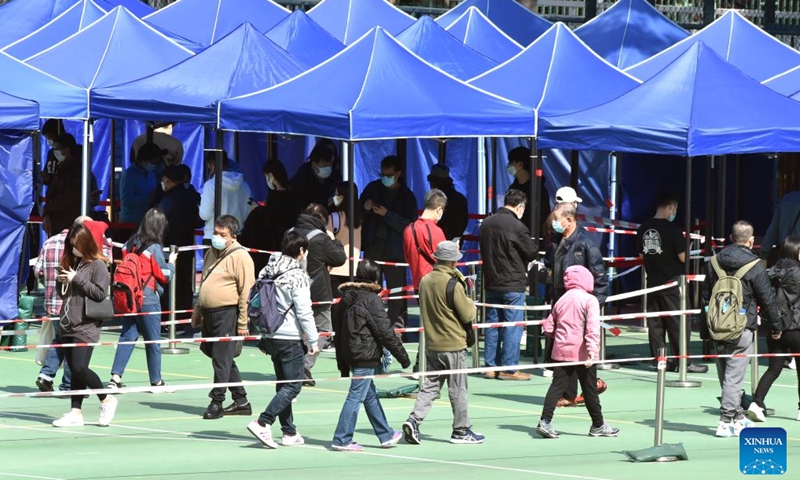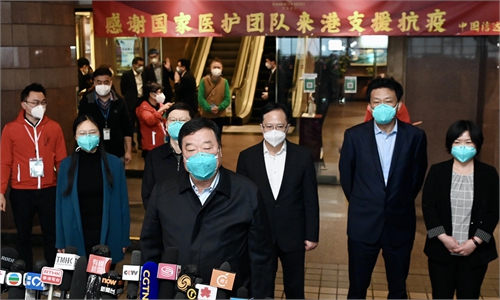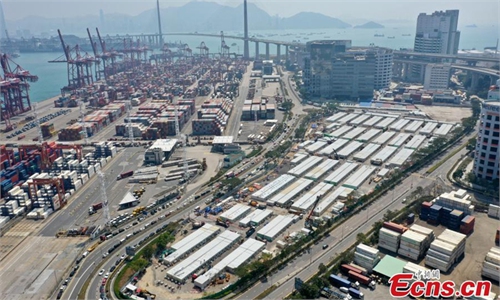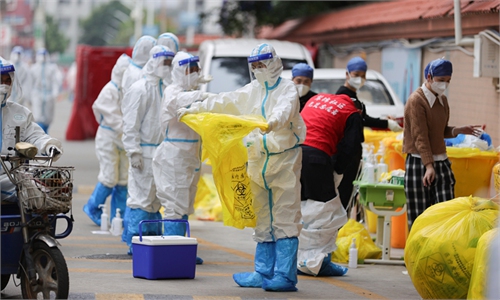HK mulls stay-at-home order during mass testing
Sufficient quarantine facilities needed before citywide testing: expert

Citizens wearing face masks are seen at a park in Hong Kong, south China, Feb. 25, 2022. Hong Kong reported 10,010 new COVID-19 cases and 47 deaths on Friday, official data showed.Photo:Xinhua
Mass testing is a very good opportunity for the Hong Kong Special Administrative Region (SAR) to control and reverse the worsening epidemic situation, and the SAR government needs to ramp up efforts to mobilize resources as much as possible to facilitate citywide testing, including arranging more quarantine facilities or seeking help from the central government for medical staff, lawmakers and experts said on Tuesday.
Chief Executive of Hong Kong Carrie Lam said the biggest aim of the mass testing in March is to clear COVID-19 cases, and the best way to do this is to allow residents to stay put before a negative test result comes out. The government is also mulling a specific plan on whether residents will be ordered to stay at home during the testing.
According to Hong Kong media reports, at least two mass testing schemes on the population of 7.5 million are under discussion - three rounds of tests every seven days or three rounds of tests every three days - which will respectively last 21 days or nine days.
The two schemes considered a short period of lockdown on residents during the first round of tests, during which residents are still allowed to purchase food, the Hong Kong media reported.
The second scheme of mass testing will consider whether to shorten the overall testing and lockdown periods, and how the mainland can help boost the number of daily testing kits, the media report said.
For the mass testing, "the priority must be to keep the lockdown period as short as possible, but I understand that the shorter the lockdown is, the more chaotic it may be, considering that it would be the very first trial for the authorities and the residents to do it," said Hoffman Ma Ho-man, a member of the National Committee of the Chinese People's Political Consultative Conference and member of the Hong Kong Culture Association.
According to a latest analysis report based on data sent by Ma to the Global Times, Ma said that in the present stage, the Hong Kong public is very united as they are eager to see the epidemic successfully contained in a short time and are also anticipating the possibility of a lockdown.
The topics "lockdown," "home isolation" and "class suspension" have trended on social media and received a great deal of attention among Hong Kong netizens, according to the report. It said the most popular voices of the public were those hoping the authorities could strike a balance between the epidemic fight and stable operation of the economy and residents' basic livelihood.
Their biggest concern was the uncertainty over how long the home quarantine will last, which prompted some residents to stock up on groceries. Some residents were worried whether the SAR government could ensure the epidemic control work was well organized, the report said.
Hong Kong registered 32,597 confirmed cases on Tuesday, the fifth day of daily confirmed cases surpassing 10,000. In the past 24 hours, 117 patients died, 106 of whom were senior citizens. The total deaths from the fifth round of outbreak now reached 808.
The latest calculation made by the Li Ka Shing Faculty of Medicine, the University of Hong Kong (HKUMed), showed the fifth round of the epidemic will reach its peak in around a week, when daily infections will probably reach 182,000. At the end of this wave, some 4.3 million people could get infected, equivalent to 58 percent of the city's population.
Horace Cheung Kwok-kwan, a member of LegCo and a non-official member of the Executive Council, told the Global Times that the best opportunity to roll out citywide testing is when aid from the central government, including measures to boost testing capability and quarantine facilities, was ready, so as to reverse the epidemic situation.
The quarantine facility in Tsing Yi was built in seven days and was already starting to receive patients with mild symptoms on Tuesday. Five other temporary community quarantine facilities have all completed site preparation work, the Global Times learnt.
Only when there are sufficient quarantine facilities for all confirmed cases and their close contacts, together with logistical support for the chronically sick, the elderly and the disabled who are living alone, will the benefit of citywide testing come into full play, Yuen Kwok-yung at the University of Hong Kong (HKU) told the Global Times on Tuesday.
"If all these logistical issues are not solved before the whole population is tested, the benefit will not be great and the sixth wave may soon follow. And of course, we should be well prepared for the sixth wave with much better vaccination, contact tracing and lockdown capacity before another new variant comes," Yuen noted.
To solve the issue, the SAR government should also have extra temporary quarantine facilities prepared, such as renting of charity houses, public venues including museums or schools, and gyms for quarantine cases with mild symptoms or asymptomatic cases, Cheung noted.
Ma suggested the priority should be given to elderly people who live alone, the elderly in care homes, and residents living in poor conditions. Other patients with mild symptoms could undergo home quarantine while following clear protocols.
To better facilitate mass testing, Cheung also suggested that Hong Kong should also consider seeking help from the mainland for medical staff and carers to alleviate overburdened medical resources.
Hong Kong has relaxed some of the requirements for bringing in caregivers in the nursing profession through the Supplementary Labour Scheme for a period of three months until May 31, which will facilitate the recruitment of caregivers to Hong Kong, the Labour Department of Hong Kong SAR said Tuesday.
The HKSAR government has requested that the central government coordinate with relevant mainland departments to facilitate the process of hiring 1,000 temporary contracted caregivers from the mainland for three months.
As one way of speeding up the citywide testing, Kennedy Wong Ying-ho, the newly elected lawmaker of a functional constituency, told the Global Times that nucleic acid testing samples can be sent to Guangdong so as to overcome Hong Kong's shortfall in testing capabilities.
Measures such as transferring patients to Shenzhen for quarantine and medical facilities should also be considered by the SAR government to alleviate stretched medical resources in Hong Kong, Wong said.
The central government has already organized nucleic acid testing teams composed of about 9,000 people to facilitate mass testing in Hong Kong, and they can leave for the city whenever Hong Kong needs them, said Li Dachuan, an official from the National Health Commission.



